人教新目标九年级英语Unit1-Unit9教案
新目标人教版九年级unit1教案
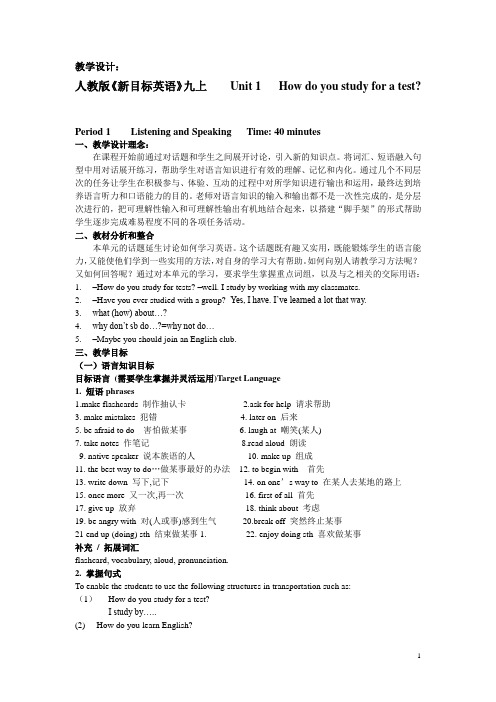
教学设计:人教版《新目标英语》九上Unit 1 How do you study for a test?Period 1 Listening and Speaking Time: 40 minutes一、教学设计理念:在课程开始前通过对话题和学生之间展开讨论,引入新的知识点。
将词汇、短语融入句型中用对话展开练习,帮助学生对语言知识进行有效的理解、记忆和内化。
通过几个不同层次的任务让学生在积极参与、体验、互动的过程中对所学知识进行输出和运用,最终达到培养语言听力和口语能力的目的。
老师对语言知识的输入和输出都不是一次性完成的,是分层次进行的,把可理解性输入和可理解性输出有机地结合起来,以搭建“脚手架”的形式帮助学生逐步完成难易程度不同的各项任务活动。
二、教材分析和整合本单元的话题延生讨论如何学习英语。
这个话题既有趣又实用,既能锻炼学生的语言能力,又能使他们学到一些实用的方法,对自身的学习大有帮助。
如何向别人请教学习方法呢?又如何回答呢?通过对本单元的学习,要求学生掌握重点词组,以及与之相关的交际用语:1. –How do you study for tests? –well. I study by working with my classmates.2. –Have you ever studied with a group?- Yes, I have. I’ve learned a lot that way.3. what (how) about…?4. why don’t sb do…?=why not do…5. –Maybe you should join an English club.三、教学目标(一)语言知识目标目标语言(需要学生掌握并灵活运用)Target Language1. 短语phrases1.make flashcards 制作抽认卡2.ask for help 请求帮助3. make mistakes 犯错4. later on 后来5. be afraid to do 害怕做某事6. laugh at 嘲笑(某人)7. take notes 作笔记8.read aloud 朗读9. native speaker 说本族语的人10. make up 组成11. the best way to do…做某事最好的办法12. to begin with 首先13. write down 写下,记下14. on one’s way to 在某人去某地的路上15. once more 又一次,再一次16. first of all 首先17. give up 放弃18. think about 考虑19. be angry with 对(人或事)感到生气20.break off 突然终止某事21 end up (doing) sth 结束做某事1. 22. enjoy doing sth 喜欢做某事补充/ 拓展词汇flashcard, vocabulary, aloud, pronunciation.2. 掌握句式To enable the students to use the following structures in transportation such as:(1)----How do you study for a test?----I study by…..(2)----How do you learn English?----I learn by….(3)----Do you learn English by…?----Yes, I do / No, I don’t.(4)----Have you ever studied with a group?----Yes, I have. I’ve learned a lot that way.(二)语言技能目标1.学会谈论如何学英语。
人教版新目标九年级英语Unit1单元教案
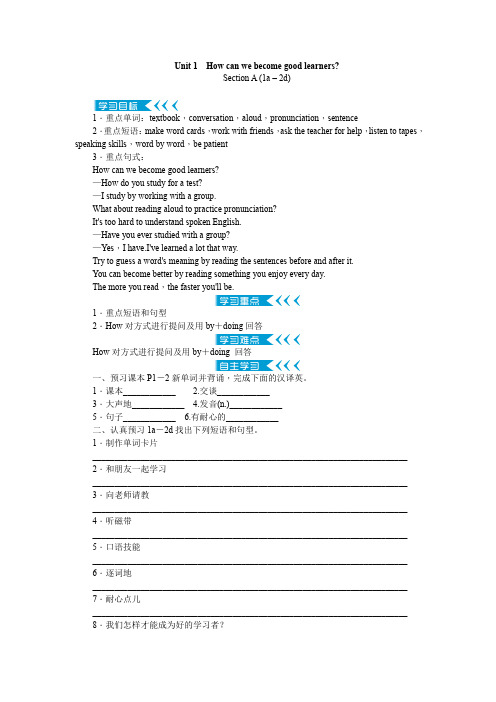
Unit 1How can we become good learners?Section A (1a-2d)1.重点单词:textbook,conversation,aloud,pronunciation,sentence2.重点短语:make word cards,work with friends,ask the teacher for help,listen to tapes,speaking skills,word by word,be patient3.重点句式:How can we become good learners?—How do you study for a test?—I study by working with a group.What about reading aloud to practice pronunciation?It's too hard to understand spoken English.—Have you ever studied with a group?—Yes,I have.I've learned a lot that way.Try to guess a word's meaning by reading the sentences before and after it.You can become better by reading something you enjoy every day.The more you read,the faster you'll be.1.重点短语和句型2.How对方式进行提问及用by+doing回答How对方式进行提问及用by+doing 回答一、预习课本P1-2新单词并背诵,完成下面的汉译英。
1.课本____________ 2.交谈____________3.大声地____________ 4.发音(n.)____________5.句子____________ 6.有耐心的____________二、认真预习1a-2d找出下列短语和句型。
(共14套)最新人教新目标版 九年级英语(全册)教学案汇总(含全册内容)(打包下载)
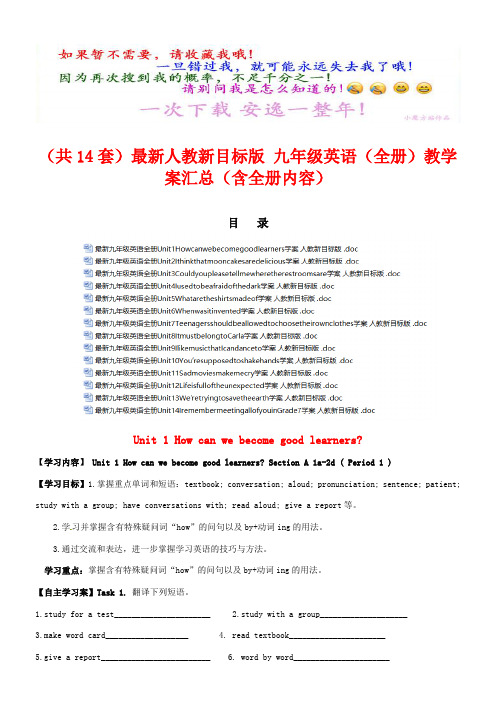
(共14套)最新人教新目标版九年级英语(全册)教学案汇总(含全册内容)目录Unit 1 How can we become good learners?【学习内容】Unit 1 How can we become good learners? Section A 1a-2d ( Period 1 )【学习目标】1.掌握重点单词和短语:textbook; conversation; aloud; pronunciation; sentence; patient; study with a group; have conversations with; read aloud; give a report等。
2.学习并掌握含有特殊疑问词“how”的问句以及by+动词ing的用法。
3.通过交流和表达,进一步掌握学习英语的技巧与方法。
学习重点:掌握含有特殊疑问词“how”的问句以及by+动词ing的用法。
【自主学习案】Task 1. 翻译下列短语。
1.study for a test______________________2.study with a group____________________3.make word card___________________4. read textbook______________________5.give a report_________________________6. word by word______________________7.大声朗读_________________________ 8.对话____________________________9.练习发音__________________________Task 2. I study for a test by____________________________________________I learn English by________________________________________________【合作学习案】e g. A: How do you study for s test? / learn English?B:I study for a test / learn English by...①—How do you study for a test? —I study by working with a group.②We usually go to school by bike.③English is spoken by many people.by的意思是“通过……的方式”时,后接;当表示“乘坐”时, 后跟;它还可以表示 , 用于被动语态,引导出动作的发出者。
人教版新目标九年级英语教案Unit9第九单元教学设计
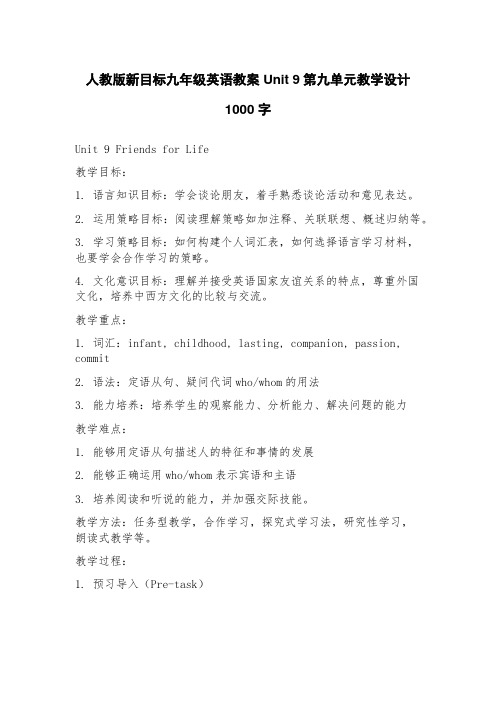
人教版新目标九年级英语教案Unit 9第九单元教学设计1000字Unit 9 Friends for Life教学目标:1. 语言知识目标:学会谈论朋友,着手熟悉谈论活动和意见表达。
2. 运用策略目标:阅读理解策略如加注释、关联联想、概述归纳等。
3. 学习策略目标:如何构建个人词汇表,如何选择语言学习材料,也要学会合作学习的策略。
4. 文化意识目标:理解并接受英语国家友谊关系的特点,尊重外国文化,培养中西方文化的比较与交流。
教学重点:1. 词汇:infant, childhood, lasting, companion, passion, commit2. 语法:定语从句、疑问代词who/whom的用法3. 能力培养:培养学生的观察能力、分析能力、解决问题的能力教学难点:1. 能够用定语从句描述人的特征和事情的发展2. 能够正确运用who/whom表示宾语和主语3. 培养阅读和听说的能力,并加强交际技能。
教学方法:任务型教学,合作学习,探究式学习法,研究性学习,朗读式教学等。
教学过程:1. 预习导入(Pre-task)通过显示26个英文字母,让学生回忆并列出所有以字母“F”开头的词汇,包括名词、形容词和动词。
教师在课堂前五分钟录下结果。
集体看一看,并补全缺少的词汇。
2. 输入新信息(Input)(1)任务1 完形填空让学生看到P63-P64的Team Building后,完成练习。
(2)任务2 阅读理解让学生阅读第一篇文章。
找到文章中描述朋友关系的词句,把它们圈起来。
(只用一分钟)接着,再读文章一遍,用自己的话回答问题。
(3)任务3 语法:定语从句a. 回忆练习:请学生跟随老师大声读一遍P66中的例句,并在课本上用横线把定语从句圈出来。
b. 给出Grammars P93中的定语从句。
分类规定。
c. 设计练习。
请学生阅读P93中的定语从句,并按照汉语意思,写出英语句子。
例如:我能听懂讲师讲英语的课。
人教版新目标英语九年级Unit1教案

人教版新目标英语九年级Unit1教案Listen again and match each question from 2a with an answer in the box on page 3.2c Doing a pairworkNext we are going to make a conversation in pairs using the information from activities 2a and 2b.A: Have you ever studied with a group?B: Yes, I have. I’ve learned a lot that way.A: Have you ever learned English by watching videos?B: Yes, I have. I’ve learned a lot that way.A: Have you ever practiced conversations with friends?B: Yes, I have. I’ve learned a lot that way.A: Have you ever listened to tapes?B: Yes, I have. I’ve learned a lot that way.A: Have you ever read aloud to practice pronunciation?B: Yes, I have. I’ve learned a lot that way.3a Reading the article and completing the chart1.Reading to the tapeWe are going to read the article on page 4. First we shall read to the tape together. That is, we start reading aloud as the recorder goes, and we stop reading aloud as the recorder stops. While reading, let’s pay enough a ttention to the pauses, the pronunciation and the intonation of the native reader. Make our reading aloud as the same as the reader’s.2.Reading and dividing the article into partsNext we are going to read aloud the article slowly and clearly. We will try to divide it into thought groups.3.Reading and underliningWe shall read the article once again, this time, to underline all the useful expressions in it. After school, you are going to write them down in your notebook.4.Translating and completing the chartBecause you have read this article many times you are going to translate it into Chinese first and then complete the chart on page 4.Who will be the first to have a try?Ways of learning EnglishNot successful OK SuccessfulLillian Li Studyinggrammar memorizing thewords of popsongsreading EnglishmagazinesWei Ming watching movies watching Englishmoviesstudying grammarLiu Chang havingconversations/with friends joining the English clubSilence, please! We are going to have a role play in pairs. One of the pair is to be one of the people in 3a. The other is to interview him or her about learning English.Zhao: Excuse me, Li Hong. Could you help me with my English?Li: Yes, please. What’s the matter?Zhao: I have difficulty studying grammar.Li: Grammar? I never studying grammar. I study English mostly by memorizingthe words of pop songs.Zhao: No grammar at all?Li: Yes, I did study grammar. But I study it by reading English magazines. I putgrammar learning into reading articles. That is the best way to understandEnglish grammar.Turn to page 4 to check √what you do to learn English in the box.Closing down by asking and answering—How did you learn English?*I listened to English them every day.*I read English books many times a day.*I learned many English songs by heart.*I sang the English songs to myself.*I learned every new English word in the text.*I learn English by going to English classes.*I do English homework at school.*I read English textbooks in the evening.*I speak English very slowly.*I play computer games in English.*I read a lot of English sentences in the morning.*I do well in class English tests.*I get a lot of good advice on learning English from my teacher.*I discuss English problems with my classmates.*I follow the advice from my father.*I learn English sounds from the tape.*I use English-English dictionaries.*I listen to recordings and English-language TV.*I talk to native speakers every chance I got.*I read books in English, mostly novels.*I learn a lot of new words from English books.*I write more and more e-mail in English.*I use English more than my first language.*Most of my reading (websites and books) is in English.Section BGoals●To listen about learning English●To talk about learning English●To read about learning EnglishProceduresWarming up by reading to the recordingHello, everyone. To begin with, let’s listen and read to the recording of the text HOW DO YOU LEARN BEST? That is, read aloud to the tape, as fast as the tape goes, as clearly as the native reader reads. OK? Here we go!My cat speaks English.Sometimes my cat comes to me and tells me that she is hungry. Or that her leg hurts. How does my cat tell me these things? I don't speak pussy-cat language.1a Reading and checkingLearning English can be both easy and difficult. What things are easy for you? And what things are difficult for you? Now turn to page 5, read the list on the top and check √the statements that are true for you.1b Making a listYou have read and checked the statements true for you. Now think and make a list of other things difficult for you, too.I don’t know how to…!1. I don’t know how to use commas.2. I don’t know how to work with others.3. I don’t know how to mak e flashcards.4. I don’t know how to read the textbook.5. I don’t know how to make vocabulary lists.6. I do n’t know how to listen to tape.7. I don’t know how to ask the teacher for help.8. I don’t know how to study for a test.9. I don’t know how to work with a group.10. I don’t know how to watch English videos.11. I don’t know how to practice conversa tions with friends.12. I don’t know how to read aloud to practice pronunciation.13. I don’t know how to learn by using English.14. I don’t know how to get more specific suggestions.15. I don’t know how to read English magazines.16. I don’t know how to learn new words.17. I don’t know how to memorize the words.18. I don’t know how to studying grammar19. I don’t know how to watching English movies20. I don’t know how to joining the English club21. I don’t know how to improve her English22. I don’t know how to get lots of practice13. I don’t know how to ask teachers about the best ways to learn more English.2a Listening and checkingPaul is a nice boy. He works hard at his English, but still has many learning challenges. Now listen to find out what challenges he has and check them in the box on page 5.2b Listening and matchingNow listen again to Paul talking about his challenges at learning English and match them with the solutions listed in the box on page 5. While listening, pay attention to the structures of the sentences.2c Doing pairworkIN pairs we are going to role play conversations using the information from activities 2a and 2b.I don’t have a partner to practiceMaybe you should join an English language club. English with.I can’t get the pronunciation right.Listening can help.I forget a lot of new words. Write the new words on cards and study them daily.I can’t understand when people talk to me. You can join an English club to talk to people more in English.I can’t understand the words inmagazines.You can look them up in a dictionary.I don’t get much writing practices.Start writing an English diary every day.I read very slowly. You should read to the recording of the text.I make mistakes in grammar. Why d on’t study the basic sentence patterns3a Reading and cuttingIt’s time to read the text HOW I LEARN ENGLISH. Now read and check (/) the senten ces.We are going to read the text again to study the form and function of all the predicate verbs. Next we shall read the text for the third time to underline all the useful expressions. After class you are to copy them into your notebook.All right, read the text the fourth time and circle all the signal words, or the linking words which connect all the short sentences.Now you may read the statements in the box on page 6 following the text. Write “T” or “F” beside each statement.3b Writing a letterYour friend Lin Feng is having difficulties with her English. Write her a letter telling her how to become a better English learner.Dear Lin Feng,I know it isn’t easy to learn English, but I have some ideas that may help. You said you couldn’t understand people who talked fast. Well, you can try to listen for the most important words, not every word. It is difficu lt to understand by listening what you have not read or what you can’t understand well by reading. To listen well you have to read well. So keep on reading English. Listening and reading to the recording of the text is very important, too. Every text, after being read, should be listened to and read aloud to the tape. At first you may find it difficult to follow the reader reading aloud the text. Don’t worry. If you keep practicing you will be able to read aloud as fast as the native reader from the tape. And then you can understand people who talk fast in English.Yours,Tai ZuoYou have been learning English for at least three years. That is such a long time. Now think about the things that have helped you the most in learning English. Write an article telling others about them.4 Doing an interviewNext we shall do an interview in groups of four. Ask the three group mates about learning English. Take notes of what they say. Tomorrow you shall stand to tell the class about theirQ. What isn’t easy about learning English? A. Reading is not easy.Q. What do you do about this? A. I try to cut the sentences into thoughtgroups.Q. What is your favorite way to learn more English? I read and read aloud a lot. These are the best way.SELF CHECK1.Filling in the blankWe shall make a check on our use of expressions first. Turn to page 7 and fill in each blank with the correct word given. Change the form of the word if necessary. Then make your own sentences with each word.Complete the sentences Make your sentences1. You should write down new English wordsin a vocabulary list.Don’t trust your memory. Write it down.2. If you don’t know how to spell new words,look them up in a dictionary.I don’t know how to spell your name.3. The best way to improve your English is tojoin an English club.I’d like to join the school football tea.4. Another thing that he find very difficult wasEnglish grammar.I find it easy to learn English.5. This kind of paper feels very soft. Do you feel cold?2.Writing an articleTurn to page 7 and write an article about Xu Zheng using the notes on Xu and his essay.Xu Zheng: a boy fond of EnglishMost people in the world speak English as a second language. And so does Xu Zheng. Yesterday I asked Xu Zheng about his ways to learn English. He said he learns by making up conversations and speaking to friends in English. When I asked about studying pronunciation, he said he spent much time on it, but he still found native speakers’ pronunciation difficult to learn.I said to him, “You are a computer student. Why are you so interested in English?”“English popular in science. And it is popular around the world for computers,” he told me. “I like writing notes, watching movies and listening to pop songs. But I like reading in English online most, ” added he.Xu Zheng is right. English can really help us understand many new things from other countries. Let’s learn from Xu Zheng. Let’s be fond of English, too.IReading: How do we deal with our problems?As English is learned mostly through reading in China, we shall now turn to page 8 to learn to read the article entitled: How do we deal with our problem?Before reading, please go over the vocabulary list for reading on page 146. Get yourself familiarized with all the words and expressions to be found in the article.While reading try to divide the sentences into thought groups and underline all the expressions useful to you. While you are reading it for the second time, try to circle all the linking words and try translating the text into Chinese.After reading, copy the underlined expressions into your Phrase Book as home.Expressions from How do we deal with our problem?rich or poor, young or old, have problems, deal with one’s problems, become unhappy, worry about one’s problems, do well at school, influence the way, behave well with…, deal with one’s problems, be angry with…, feel unfair, stay angry for years about…, t ime goes by, lose goodfriendships, see…playing together, have disagreements, talk to each other, last for long, an important lesson for…,solve a problem by learning to forget, regarding problems as challenges, complain about school, have too much work to do, the rules are too strict, change…into…, an important part of one’]s development, as young adults, be one’s duty, to try one’s best, to deal with…in one’s education, with the help of…, thinking of something worse, comparing…to…,find one’s problems, think about…, for example, a very clever scientist, regards…as unimportant, become very famous and successful, worry about…, face the challenges。
人教版新目标九年级英语Unit9单元集体备课教案
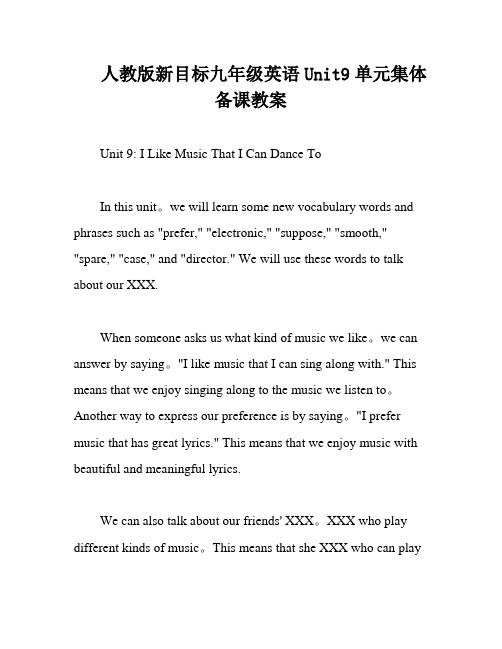
人教版新目标九年级英语Unit9单元集体备课教案Unit 9: I Like Music That I Can Dance ToIn this unit。
we will learn some new vocabulary words and phrases such as "prefer," "electronic," "suppose," "smooth," "spare," "case," and "director." We will use these words to talk about our XXX.When someone asks us what kind of music we like。
we can answer by saying。
"I like music that I can sing along with." This means that we enjoy singing along to the music we listen to。
Another way to express our preference is by saying。
"I prefer music that has great lyrics." This means that we enjoy music with beautiful and meaningful lyrics.We can also talk about our friends' XXX。
XXX who play different kinds of music。
This means that she XXX who can playdifferent genres of music。
人教版新目标九年级英语全册教案
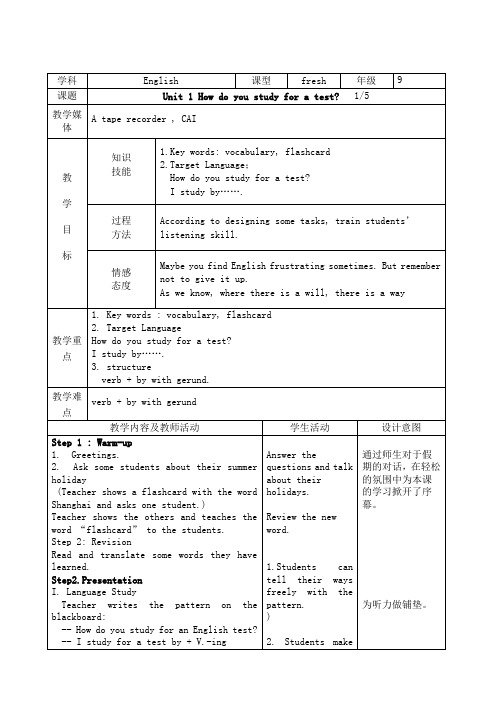
Unit 3 Teenagers should be allowed to choose their own clothes.Section AThe Third PeriodTarget language:A: What rules do you have at home?B: Well, I'm not allowed to go out on school nights. How about you?A: I'm not allowed to go out on school nights either. But I can study at a friend's house.This activity reviews the use of always,sometimes, usually and never.Point to the picture. Ask students to describe what is happening in the picture.Help students to say, The boy is late for class. Invite a student to read the four questions in the box to the class.Read the instructions and remind students of the exact meanings of the adverbs of frequency.Ask students to write A after things they always do, U after things they usually do, S after things they sometimes do and N for things they never do.II. 1bThis activity provides oral practice using the target language.Point out the sample conversation. Ask a pair of students to say it to the class.As the pairs work together, walk around the room offering help if necessary.Ask several pairs to share their conversations with the class.III.2aThis activity provides practice in Look at thepictures and saywhat is happeningin each picture.Students finishthe task on theirown in1aPair work.Talk with his/herpartner abouthis/her answers inActivity 1a.对看图作文能力进行培养。
最新人教版九年级英语全册教案Unit 1 教案
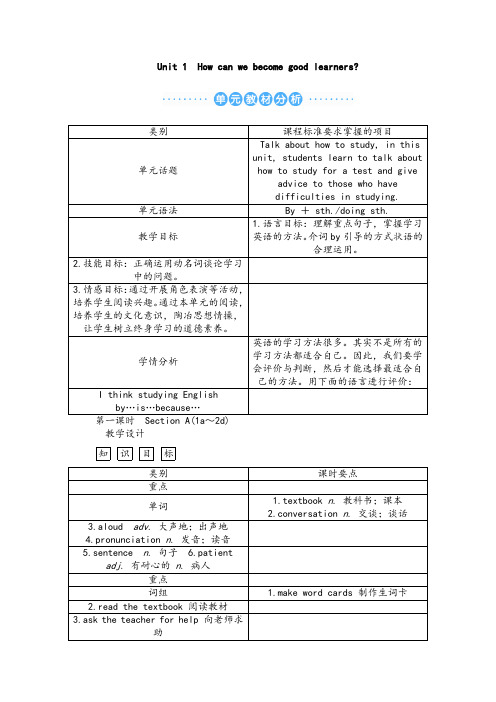
Unit 1How can we become good learners?类别课程标准要求掌握的项目单元话题Talk about how to study, in this unit, students learn to talk about how to study for a test and give advice to those who havedifficulties in studying.单元语法By + sth./doing sth.教学目标1.语言目标:理解重点句子,掌握学习英语的方法。
介词by引导的方式状语的合理运用。
2.技能目标:正确运用动名词谈论学习中的问题。
3.情感目标:通过开展角色表演等活动,培养学生阅读兴趣。
通过本单元的阅读,培养学生的文化意识,陶冶思想情操,让学生树立终身学习的道德素养。
学情分析英语的学习方法很多。
其实不是所有的学习方法都适合自己。
因此,我们要学会评价与判断,然后才能选择最适合自己的方法。
用下面的语言进行评价:I think studying Englishby…is…because…教学设计知识目标类别课时要点重点单词1.textbook n. 教科书;课本2.conversation n. 交谈;谈话3.aloud adv. 大声地;出声地4.pronunciation n. 发音;读音5.sentence n. 句子6.patientadj. 有耐心的n. 病人重点词组 1.make word cards 制作生词卡2.read the textbook 阅读教材3.ask the teacher for help 向老师求助课堂环节§自主学习案翻译下列词组。
1.通过制作生词卡by__making__word__cards2.通过听录音带by__listening__to__tapes3.向某人寻求帮助ask__sb.for__help4大声读来练习发音read__aloud__to__practice__pronunciation 5.小组合作学习study__with__a__group6.和朋友练习对话practice__conversations__with__friends7.逐个单词word__by__word8.作报告give__a__report9.意群word__groups10.慢慢来it__takes__time11.口语技能speaking__skills12英语口语spoken__English§课堂导学案Step 1 准备与热身(Preparation)Leadin with a free talk(自由对话导入新课)(2分钟)Greeting with the students:Hello, everyone.Welcome back to school.I'm very happy to see you again.Most of you got good grades last term ! Of course, don't lose your heart if you didn't get good grades.OK.Today, let's talk about how to study for a test and how to learn English well.T: How do you study English? Do you study English by the following ways? (Show some pictures and present the important phrases.) T: How do you study English?S: I study English by ________.working with friends making word cardsasking the teacher for help reading the textbookworking with a group listening to tapesStep 2 呈现与输入(Presentation)1.要求学生翻开课本P1,迅速阅读1a部分的内容。
人教版九年级英语全册教案

Unit 1 How can we become good learners?学习目标认知目标:1. Talk about how to study. 学会讨论各种学习方法和策略。
2. Find out your suitable learning methods. 找出适合自己的学习方法。
情感目标:通过对学习方法的学习,培养学生用正确而科学的方法做事的能力,明白“一份耕耘,一份收获”。
技能目标:(1)熟练掌握下列词汇:aloud pronunciation discover repeat note pronounce increase speed partner create active connect review knowledge wisely born attention(2)熟练掌握下列短语:work with friends ask the teacher for helpread aloud look up practice pronunciationconnect…with…pay attention to(3)掌握下列句型:How do you study English?I learn by working with a group.Do you learn English by reading aloud?Yes, I do. It helps my pronunciation.How can I read faster?You can read faster by reading word groups.How can I improve my pronunciation?One way is by listening to tapes.But whether or not you can do this well depends on your learning habits.重点、难点(Key points and difficulties)1. 学会运用how来询问做事方式2. 学会运用by + doing的结构表达做事方式。
人教新目标九年级英语全册教案unit9教学设计
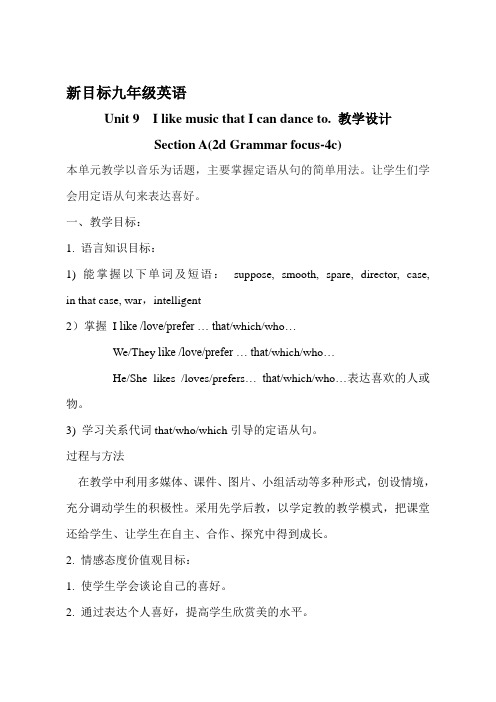
新目标九年级英语Unit 9 I like music that I can dance to. 教学设计Section A(2d Grammar focus-4c)本单元教学以音乐为话题,主要掌握定语从句的简单用法。
让学生们学会用定语从句来表达喜好。
一、教学目标:1. 语言知识目标:1) 能掌握以下单词及短语:suppose, smooth, spare, director, case, in that case, war,intelligent2)掌握I like /love/prefer … that/which/who…We/They like /love/prefer … that/which/who…He/She likes /loves/prefers… that/which/who…表达喜欢的人或物。
3) 学习关系代词that/who/which引导的定语从句。
过程与方法在教学中利用多媒体、课件、图片、小组活动等多种形式,创设情境,充分调动学生的积极性。
采用先学后教,以学定教的教学模式,把课堂还给学生、让学生在自主、合作、探究中得到成长。
2. 情感态度价值观目标:1. 使学生学会谈论自己的喜好。
2. 通过表达个人喜好,提高学生欣赏美的水平。
3. 激发学生的学习兴趣和学习热情。
二、教学重难点1. 教学重点:1)suppose, smooth,spare,director,case,in the case,war的用法。
2)句型:I like music that/which I can sing along with.She likes musicians who play different kinds of music.2. 教学难点:学习关系代词that/who/which引导的定语从句。
教学过程Step 1 Warming up1.Free talk. Ask “What kind of music/movies do you like?”I like musicthat/which/who …2.Have students report their answers to the whole class.【设计意图】课前热身,通过小对话交流简单了解个人喜好,再用知识扩充的形式去帮助学生认识和了解各种音乐类型的表达方式,很好地为接下来的个人喜好交流奠定基础。
完整版)人教版英语九年级Unit1教案设计
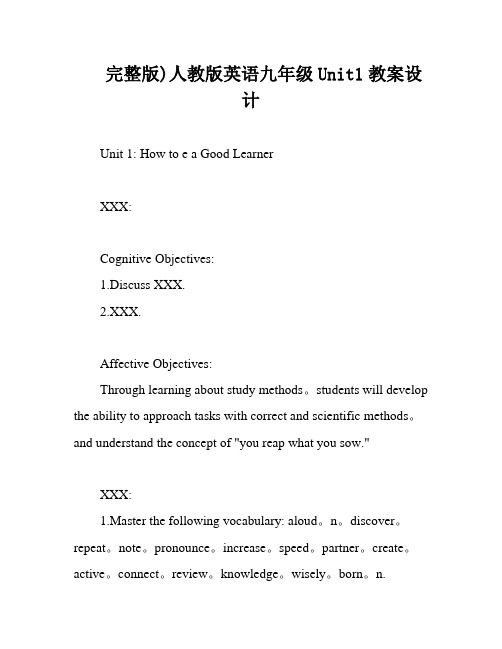
完整版)人教版英语九年级Unit1教案设计Unit 1: How to e a Good LearnerXXX:Cognitive Objectives:1.Discuss XXX.2.XXX.Affective Objectives:Through learning about study methods。
students will develop the ability to approach tasks with correct and scientific methods。
and understand the concept of "you reap what you sow."XXX:1.Master the following vocabulary: aloud。
n。
discover。
repeat。
note。
pronounce。
increase。
speed。
partner。
create。
active。
connect。
review。
knowledge。
wisely。
born。
n.2.Master the following phrases: work with friends。
ask the teacher for help。
read aloud。
look up。
practice n。
connect。
with。
pay n to.3.Master the following sentence structures:How do you study English?I learn by working with a group.Do you learn English by reading aloud?Yes。
I do。
It XXX.How can I read faster?You can read faster by reading word groups.How can I XXX?One way is by XXX.However。
人教版新目标九年级英语Unit1单元集体备课教案
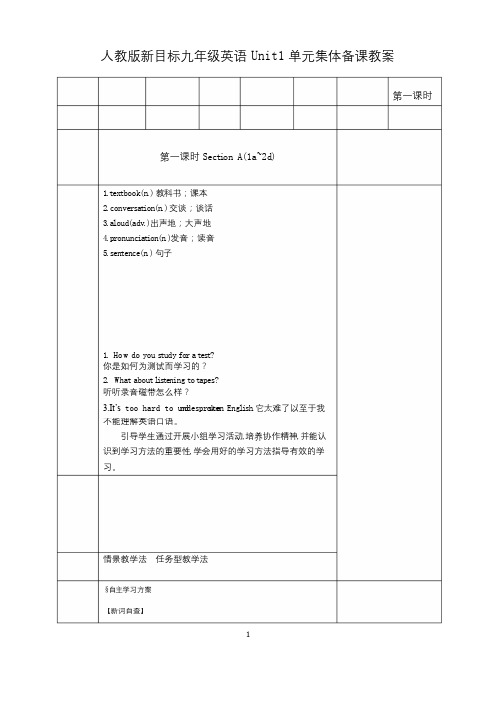
人教版新目标九年级英语Unit1单元集体备课教案第一课时第一课时Sect i on A(1a~2d)1.tex tbook(n.)教科书;课本2.conversa t ion(n.)交谈;谈话3.a loud(adv.)出声地;大声地4.pronunc ia t ion(n.)发音;读音5.sen tence(n.)句子1. How do you s tudy fo r a t e s t?你是如何为测试而学习的?2.What abou t l i s t e ning to t apes?听听录音磁带怎么样?3.It’s too hard to u n n d de sp r o s k t e a n Engl i sh.它太难了以至于我不能理解英语口语。
引导学生通过开展小组学习活动,培养协作精神,并能认识到学习方法的重要性,学会用好的学习方法指导有效的学习。
情景教学法任务型教学法§自主学习方案【新词自查】1根据句意及汉语提示完成句子。
1.We s tudy by read ing a loud(大声地).2.My fa ther had a long conversa t ion(交谈)wi th me about my s tudy yes te rday.5.Our headmas te r wi l l g ive a repor t(作报告)on how to become goodl ea rners th i s a f te rnoon.Teacher: Engl i sh i s a l iv ing language.I t i s wide ly used a l l over the wor ld.I ti s no t easy to l ea rn Engl i sh wel l fo r us because we don’t have a goodcondi t ion and our t ime i s too l imi ted. But where the re i s a wi l l,the r e i sa way.I f we keep on s peaking and us ing i t,we can lea rn i t we l l. Ques t ions:环节说明:通过课前的一个师生问答互动引入新课的话题。
人教新目标九年级英语全册Unit9单元教学设计
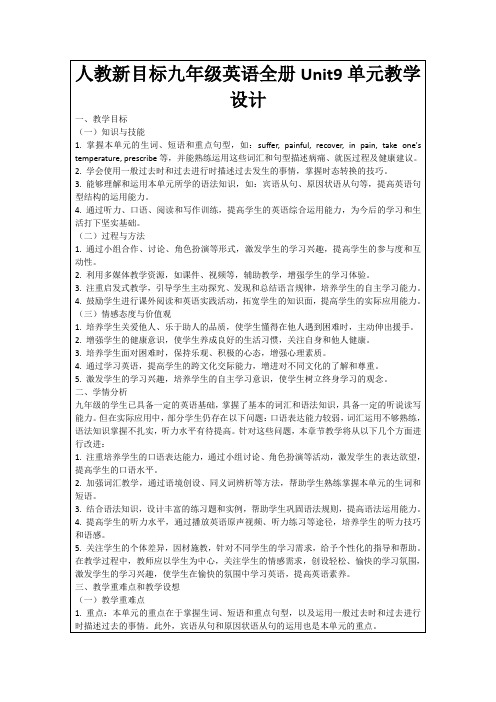
1.教学活动:学生分成小组,根据教师提供的话题进行讨论,分享各自的想法和经验。
2.教学目的:培养学生的口语表达能力,提高学生的合作能力。
3.教学步骤:
a.教师给出讨论话题,如:描述一次看病的经历、分享健康生活的小建议等。
b.学生分成小组,进行讨论,用英语表达自己的观点。
c.各小组选代表进行汇报,其他学生认真倾听,给予评价。
2.利用多媒体教学资源,如课件、视频等,辅助教学,增强学生的学习体验。
3.注重启发式教学,引导学生主动探究、发现和总结语言规律,培养学生的自主学习能力。
4.鼓励学生进行课外阅读和英语实践活动,拓宽学生的知识面,提高学生的实际应用能力。
(三)情感态度与价值观
1.培养学生关爱他人、乐于助人的品质,使学生懂得在他人遇到困难时,主动伸出援手。
c.教师对学生的练习进行批改,给予反馈,并进行针对性讲解。
d.学生根据教师的反馈,进行自我纠错,提高英语水平。
(五)总结归纳
1.教学活动:教师引导学生对本节课所学知识进行回顾和总结,巩固重点,梳理难点。
2.教学目的:帮助学生建立知识体系,提高学生的自主学习能力。
3.教学步骤:
a.教师引导学生回顾本节课所学词汇、短语、语法知识及句型。
2.互动教学:采用小组合作、讨论、角色扮演等形式,引导学生积极参与课堂活动,提高学生的口语表达能力,培养学生团队合作精神。
3.分层教学:针对不同学生的学习水平,设计不同难度的练习题和任务,使每个学生都能在原有基础上得到提高,激发学生的学习兴趣。
4.梯度训练:从基础知识的掌握到综合能力的提升,设计梯度训练,逐步提高学生的听说读写能力。
2.语法练习:完成课后练习册中与本节课相关的语法练习题,巩固宾语从句和原因状语从句的运用。
人教新目标九年级英语全册Unit9单元教学设计

二、学情分析
九年级的学生经过前两年的英语学习,已经具备了一定的词汇量和语法知识,能够进行简单的日常交流。在此基础上,他们对英语学习有了更高的期待,希望在学习中拓展视野,提高自己的语言运用能力。然而,学生在学习过程中仍存在以下问题:
1.词汇掌握不牢固:部分学生对词汇的记忆和运用不够熟练,影响阅读和写作能力的提高。
2.语法运用不够灵活:学生对一般过去时和现在完成时的掌握程度不同,需要针对不同学生进行有针对性的指导。
3.口语表达能力有限:学生在小组讨论和课堂展示中,口语表达能力有待提高,需要教师创设更多实践机会。
4.学习策略和方法有待改进:部分学生尚未形成适合自己的学习策略,需要教师在教学中引导和培养。
-实践要求:学生在讨论中要充分表达自己的观点,学会倾听他人的意见,提高口语交流能力。
5.写作作业:结合本单元主题,写一篇关于环保行动的短文,内容可以包括环保行动的意义、方法以及对未来的影响。
-实践要求:学生在写作过程中注意文章结构的安排,运用所学词汇和语法知识,提高写作水平。
6.拓展作业:鼓励学生利用网络资源,了解国内外环保政策和实践案例,拓宽视野。
(二)教学设想
1.创设情境:利用多媒体手段,如视频、图片等,创设与单元主题相关的情境,激发学生的兴趣和参与感。
-设想实践:播放与环保相关的纪录片片段,引导学生关注环境问题,并在此基础上引入本单元的话题。
2.互动式教学:鼓励学生参与课堂讨论,通过小组合作、角色扮演等活动,提高学生的口语表达和交际能力。
-实践操作:让学生用自己的话总结两种时态的用法,加深印象。
2.价值观教育:强调环保意识,鼓励学生在日常生活中关注环境问题,为保护地球贡献力量。
人教版新目标九年级英语Unit9第九单元全单元教案教学设计
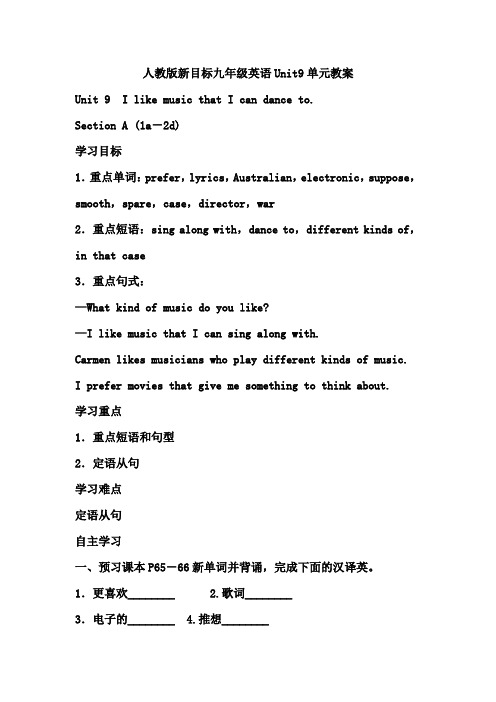
人教版新目标九年级英语Unit9单元教案Unit 9 I like music that I can dance to.Section A (1a-2d)学习目标1.重点单词:prefer,lyrics,Australian,electronic,suppose,smooth,spare,case,director,war2.重点短语:sing along with,dance to,different kinds of,in that case3.重点句式:—What kind of music do you like?—I like music that I can sing along with.Carmen likes musicians who play different kinds of music.I prefer movies that give me something to think about.学习重点1.重点短语和句型2.定语从句学习难点定语从句自主学习一、预习课本P65-66新单词并背诵,完成下面的汉译英。
1.更喜欢________ 2.歌词________3.电子的________ 4.推想________5.平滑的________ 6.空闲________7.情况________ 8.导演________9.战争________ 10.澳大利亚的________二、认真预习1a-2d找出下列短语和句型。
1.随之唱歌__________________________________________________________ ______________2.随着……跳舞__________________________________________________________ ______________3.不同种类的__________________________________________________________ ______________4.既然那样__________________________________________________________ ______________5.—你喜欢什么种类的音乐?—我喜欢能跟着唱的音乐。
英语教案人教版新目标九年级英语全册 Unit 9

Unit 9 I like music that I can dance to教学目标:能够听懂并口头表达关于音乐类型的信息。
能够用英语描述音乐、乐器、音乐家等。
能够通过听、说、读、写的综合训练提高英语综合运用能力。
教学重点:了解不同音乐类型的特点。
能够用英语描述音乐类型。
学会用定语从句描述自己喜欢的音乐。
教学难点:运用定语从句描述自己喜欢的音乐。
听力训练的提高。
教学准备:多媒体课件。
Unit 9的教材及练习题。
Step 1: Warm-upThe teacher plays a piece of music and encourages students to guess the genre of the music based on the melody and lyrics.The teacher randomly asks students about their knowledge of music.Step 2: PresentationThe teacher introduces different genres of music and plays music of different genres to help students understand the characteristics of each genre.The teacher guides students to discuss the differences between different types of music and to describe the characteristics of different genres of music in English.Step 3: PracticeThe teacher designs a listening exercise where a piece of music is played and students choose suitable adjectives to describe the song.The teacher designs an exercise where students describe their favorite type of music and use relative clauses to describe the genre of music they like.Students work in pairs to discuss their favorite music and share their descriptions using relative clauses.Step 4: Productionteacher asks students to work in small groups and create a playlist of songs for a specific event or occasion, such as a party, a wedding, or a workout session. Each group presents their playlist and explains the reason for choosing the songs.The teacher encourages students to share their opinions about different types of music and engage in a class discussion about the role of music in people's lives.Step 5: Review and AssessmentThe teacher reviews the vocabulary and grammar structures covered in the lesson and provides additional practice exercises to reinforce the learning.The teacher assesses students' understanding of the lesson through a quiz, a writing assignment, or a role-playing activity.The teacher provides feedback and guidance to help students improve their language skills and achieve their learning goals.For homework, students can:Write a paragraph about their favorite type of music and use relative clauses to describe the genre of music they like.Create a playlist of songs for a specific event or occasion and write a short explanation for why each song was chosen.Research a famous musician or band and write a short biography about them, including information about their music and achievements.Listen to a song in a foreign language and write a brief summary of the lyrics, including any new vocabulary or expressions they learned.Watch a movie or TV show that features music as a major theme or plot element, and write a review of the film, focusing on how the music enhances the story or characters.。
人教新目标九年级全一册英语:Unit 9 I like music that I can dance to. 教案
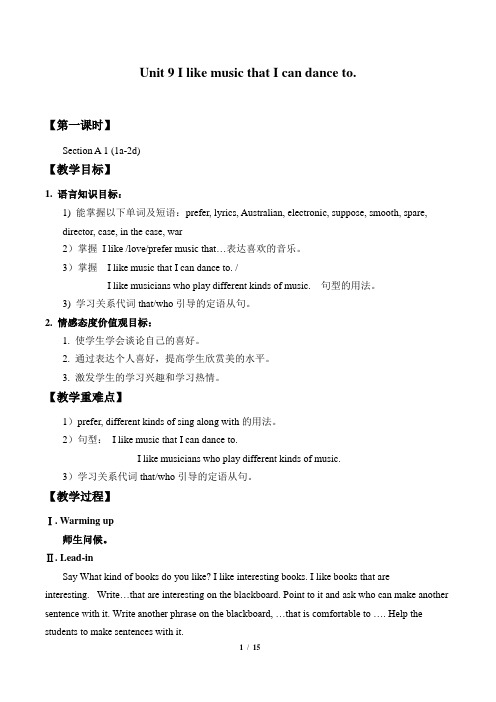
Unit 9 I like music that I can dance to.【第一课时】Section A 1 (1a-2d)【教学目标】1. 语言知识目标:1) 能掌握以下单词及短语:prefer, lyrics, Australian, electronic, suppose, smooth, spare,director, case, in the case, war2)掌握I like /love/prefer music that…表达喜欢的音乐。
3)掌握I like music that I can dance to. /I like musicians who play different kinds of music. 句型的用法。
3) 学习关系代词that/who引导的定语从句。
2. 情感态度价值观目标:1. 使学生学会谈论自己的喜好。
2. 通过表达个人喜好,提高学生欣赏美的水平。
3. 激发学生的学习兴趣和学习热情。
【教学重难点】1)prefer, different kinds of sing along with的用法。
2)句型:I like music that I can dance to.I like musicians who play different kinds of music.3)学习关系代词that/who引导的定语从句。
【教学过程】Ⅰ. Warming up师生问候。
Ⅱ. Lead-inSay What kind of books do you like? I like interesting books. I like books that are interesting. Write…th at are interesting on the blackboard. Point to it and ask who can make another sentence with it. Write another phrase on the blackboard, …that is comfortable to …. Help the students to make sentences with it.Ⅲ. Presentation1. 教师播放学生较熟悉的带有歌词或歌手的图片的流行歌曲,激发学生的学习兴趣,同事师生对话,引出本单元的内容学习,为完成1a做铺垫。
- 1、下载文档前请自行甄别文档内容的完整性,平台不提供额外的编辑、内容补充、找答案等附加服务。
- 2、"仅部分预览"的文档,不可在线预览部分如存在完整性等问题,可反馈申请退款(可完整预览的文档不适用该条件!)。
- 3、如文档侵犯您的权益,请联系客服反馈,我们会尽快为您处理(人工客服工作时间:9:00-18:30)。
Unit 1How can we become good learners?
第1题图第2题图
1.Mr.King had a long telephone with his friend this morning.
2.I often learn English words by making word
3.I’m sorry,Miss Chen.I left my English
4.The nurse is very p with grandma Wang.
Unit 2I think that mooncakes are delicious!
Unit 3Could you please tell me where the restrooms are?
教学过程
◆Step 1情境导入
◆Step 2完成教材1a-1e的任务
.要求学生翻开课本P21,迅速浏览1a部分方框中的单词及右边的表格内容。
看一看每一个地方要有什么重要的品质,并把相应的单词写在表格中
.先让两位学生分角色朗读1b方框中的对话。
然后让学生两人一组仿照对话,编一个谈论自己城市的对话。
然后在班上演示。
(3分钟)
.让学生快速浏览1c方框中的句子,要求学生听第一遍录音,让学生只是听,了解大意。
然后听第二遍录音,完成课本上1c部分的任务。
在播放录前,要求学生抓住要点,并注意一些听写技巧。
核对答案时,要求学生先读出要填写的单词,然后读出完整的句子。
(3分钟)
.要求学生听第三遍录音,让学生跟读对话,并核对答案,完成1d的任务。
(3分钟)
.先让两位学生分角色朗读1e方框中的对话。
然后让学生两人一组仿照对话,编一个完整的对话,然后在班上演示,完成1e的任务。
(3分钟)
.小结训练。
要求学生在规定的时间内完成一个小练习,并请若干学生给出自己的答案。
有错误的话及时纠正。
(2分钟)
选用方框中所给单词的适当形式补全对话
ext,place,anything,wait,afraid,look,when,get,give,early
:Is there 1.anything I can do for you?
:Yes.I’m 2.looking for the bus stop.
:This is the bus stop!
:Could you tell me 3.when the bus leaves?
:I’m 4.afraid you’ve just missed it.
:How about the 5.next one?
:In an hour.
:Isn’t there a(n) 6.earlier one?
:I’m afraid not.
:Is there a(n) 7.place where I can 8.get some rest and wait? :Yes,there is a(n) 9.waiting room just over there.
:It’s kind of you to 10.give me a hand.
Unit 5What are the shirts made of?
教学过程
◆Step 5课堂练习
Unit 6When was it invented?。
